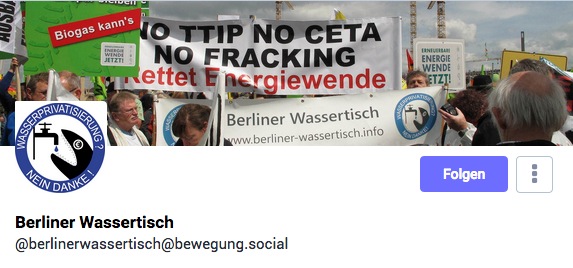Privatsphäre stärkt, Überwachung schwächt! #StopScanningMe


Suche

Schiefergas-Fracking in Deutschland?

#StopEUMercosur Erklärung

Aktion Greenpeace: #StopEUMercosur

#SaveTheOkavangoDelta

Erfolgreich! Über 1 Million Unterschriften „Green Deal“ – Europäische Bürgerinitiative (EBI)

Stop Energiecharta. #NoECT. Wir wollen raus aus dem Anti-Klimaschutz-Vertrag

Europäische Bürgerinitiative gegen biometrische Massenüberwachung (17.2.2021-17.2.2022)

Lebensgefährliche Entwicklung: Gewinnorientierung im Krankenhaus
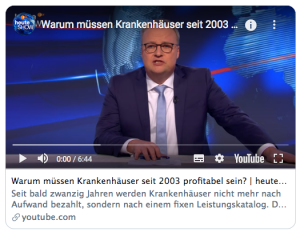
- Wassertisch-Plenum,
im NewYorck / Bethanien Mariannenplatz 2A
10997 Berlin Openstreetmap fällt coronabedingt aus Überblick (Messstellen: Oberflächengewässer und Grundwasser)


-
Letzte Beiträge
- AöW zum Weltwassertag 2023: Interkommunale Zusammenarbeit noch stärker ermöglichen
- Greenpeace: Fracking – eine unterirdisch schlechte Idee
- Bürgerinitiative gegen CO2-Endlager: Offener Brief an den Bundesminister für Wirtschaft und Klimaschutz Dr. Robert Habeck
- BUND gegen CCS-Endlager
- Jürgen Knirsch: CETA-Handelsabkommen: Eine trügerische Wette auf die Zukunft (Leserbrief an die SZ vom 8.12.2022)
- Neuere Materialien und Dokumente zur CETA-Debatte
- TAZ: Hamburger Abgeordneter über Olympia-Gedankenspiele: „Es kommt zu Vertreibungen“
- NDR: Bewirbt sich Hamburg noch einmal um Olympische Spiele?
- NGO-Bündnis fordert mit gemeinsamen Appell die Senkung des absoluten Ressourcenverbrauchs
- Allianz der öffentlichen Wasserwirtschaft warnt vor CETA: Mit dem jetzigen CETA-Text wird der Schutz der öffentlichen Wasserwirtschaft vor einer Kommerzialisierung weiter geschwächt

Delius-Klage
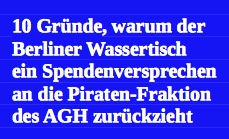
Keine Steuergelder für LNG-Fracking-Gas Terminals in Deutschland!

RSS-Feeds
Schlagwort-Archive: Deutschland
Heise: Kommentar: Fracking in Deutschland ist auch keine Lösung
15.08.2022
Von Hanns-J. Neubert
„Kein Platz, kein wirtschaftlicher Gewinn, kein Klimanutzen und dann auch noch der Umweltschaden. Der Aufwand für das Fracking würde sich nicht lohnen.“
Zum Kommentar
Correctiv: Ausgetrocknet. Deutschland kämpft um Wasser
14. Juni 2022
Von Annika Joeres, Gesa Steeger, Katarina Huth, Marlene Jacobsen, Max Donheiser
„Die Klimakrise lässt auch in Deutschland das Wasser knapp werden. Während die Bundesregierung erst ab 2030 handeln will, tobt der Kampf um Wasser längst. Nach CORRECTIV-Auswertung streiten sich Behörden, Landwirtschaft und Industrie zunehmend vor Gericht. […] Der Klimawandel ist längst Realität. Wasserkrisen häufen sich weltweit. In vielen Ländern, in Teilen der USA, in Ostafrika und Australien greifen Dürrekatastrophen, Ernteausfälle und Waldbrände um sich.“
Zum Beitrag
Klima der Gerechtigkeit: Fracking-Verbote: Irland klar dafür aber Deutschland zeigt sich unentschlossen!
10. Juni 2021
Ein Gastbeitrag von Andy Gheorghiu

Während das Irish Centre For Human Rights auf die schwerwiegenden negative Auswirkungen von Fracking hinweist, sieht die deutsche Expert*innenkommission zu Fracking keinen Grund, ein umfassendes Verbot zu empfehlen. Andy Gheorghiu stellt die Debattenschwerpunkte dar und erklärt, warum es wichtig ist, dass die Öffentlichkeit den Berichtsentwurf der deutschen Experten*innenkommission Fracking kommentiert.
Fracking ist eine höchst umstrittene Technik zur Gewinnung von Kohlenwasserstoffen (Öl und Gas) aus geologischen Schichten. Der rechtliche Rahmen für Fracking in Europa ist von Land zu Land unterschiedlich, aber die Technik als solche ist entweder ganz verboten oder ihr Einsatz eingeschränkt. Irland hat den strengsten Rechtsrahmen und erwägt sogar, die Einfuhr von Fracking-Gas zu verbieten. Deutschland hingegen hat Fracking nur in Schieferschichten verboten, lässt aber die Tür für Operationen in Sandsteinschichten und mögliche Forschungsprojekte für Schieferfracking offen. [….]
Zum Beitrag
Europäischer Gewerkschaftsbund (ETUC): CETA muss verbessert werden
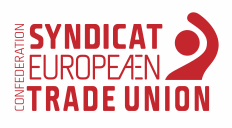 ETUC assessment on the EU-Canada Comprehensive Economic and Trade Agreement (CETA)
ETUC assessment on the EU-Canada Comprehensive Economic and Trade Agreement (CETA)
Statement approved at the Executive Committee 14-15 December 2016
- With our capacity for mobilising, European and Canadian trade unions had an influence at the concluding stage of the CETA negotiations. The final version of the agreement does not take account of all our concerns, but improvements have been achieved, particularly about protection of public services, labour rights and the environment. Now it is time for the European trade unions to continue acting and lobbying, together with the Canadian trade unions and the international trade union movement, to further improve CETA and push for a progressive global trade agenda.
- When the full text of CETA was released in February 2016, the ETUC and Canadian Labour Congress thoroughly analysed the deal. The two organisations jointly came to the conclusion that it was not a good deal for workers, and mobilised together with their affiliates and in alliance with a number of civil society organisations, in order to ‘restart a transparent negotiating process aimed at introducing in CETA binding and enforceable provisions that can really address and resolve the concerns that ETUC and CLC have raised’ (from the ‘ETUC and CLC statement on CETA’ adopted on 28 October 2016)[1].
- Despite massive public protests and expert testimony on negative impacts of the agreement, governments in Canada and Europe initially rushed to implement CETA. But thanks to mobilising and lobbying of the ETUC and its affiliates, the ratification process was stopped and improvements have been achieved, via a Joint Interpretative Instrument included in the agreement, together with unilateral declarations by some EU Member States.
- In their joint statement in October, the ETUC and CLC declared that ‘any Declaration or Instrument, to be effective and make a difference to the text of CETA, must be legally binding, having a real impact on the most controversial parts of the agreement, and fully address major concerns that the CLC and the ETUC jointly outlined’. The JII is finally legally binding (in accordance with the Vienna convention on the law treaties) and has taken on board several of our demands.
- Nevertheless, the final result is not fully in line with our expectations, particularly when it comes to some important aspects linked to public services and full enforceability of labour rights. That is why we will continue to call for further improvements in the agreement, by lobbying the European and Canadian institutions on the basis of the recognised ‘mixed status’ of CETA, the provisions in the Interpretative Instrument, and the review clause included in the agreement[2].
- While it is true that the new Investment Court System (ICS) introduced into CETA eliminates some of the worst and most obnoxious elements common to international trade tribunals (ISDS mechanisms) by introducing ethical and conflict of interest standards for tribunals, and the tribunal’s ability to dismiss claims that are without legal merit, it still privileges big multinational corporations, and can be used to intimidate democratic institutions from acting in the public interest.
- Nevertheless, since overwhelming opposition to the ICS in Europe forced the EU to deem CETA a ‘mixed agreement’, this will ensure that the ICS will not be provisionally applied until all EU Member States have ratified the agreement, giving time to challenge the ICS in the European Court of Justice, in the German Constitutional Court, and to lobby Member States not to agree it. In this regard, the ETUC also supported the request of a number of MEPs to refer CETA to the ECJ to check whether ICS was compatible with EU law. Unfortunately, this request did not go through in the European Parliament and it was rejected by an overwhelming majority in the plenary. It would now be up to the Belgian Federal Government to file such a request, as agreed with the Wallonian Parliament, and to the German Constitutional Court to consider it. The ETUC would support this, to bring legal clarity to the issue of ICS and ideally to take it out of the agreement.
- We will continue to work together using all available avenues to further improve the deal, including the opportunities provided by CETA itself through the review clause and the power of co-chairs of the CETA Joint Committee to give binding interpretations of the text. This will be particularly the case when it comes to the most critical issues still pending in the agreement, i.e. ICS, enforcement of rights, protection of public services.
- We will continue lobbying the European Commission, the Canadian Government, and the respective European and Canadian parliaments on these points – and we also urge our national members to lobby their own governments and parliaments to contribute to the improvement of the agreement, as a pre-condition for ratification. In particular, we ask the European Parliament to urge the European Commission to reopen dialogue with the Canadian government, and to put in place any effort to make sure that ETUC’s concerns are fully tackled, in order to make CETA acceptable. Furthermore, in line with the Opinion adopted by the Committee on Employment and Social Affairs on 8 December 2016, we recommend that Parliament decline to give its consent to the proposal for a Council decision on the conclusion of CETA, until such criticism and concerns are effectively addressed.
- We do not consider CETA as a benchmark for any future agreement, as we need to further mobilise and negotiate to improve it. Therefore, we will continue to demand transparency and full involvement of trade unions in the implementation of this agreement and in all future negotiations, including via appropriate representation of trade unions in any advisory groups and committees that are set up.
- The ETUC is in favour of fair and sustainable international trade. The next challenge before us is to build on and improve CETA and all post-CETA trade and investment deals, to ensure they meet a progressive trade model. There is still much more work that needs to be done to build a global progressive trade agenda – but through international solidarity, and working together, unions can reshape globalisation so that it works for all of us.
[1] https://www.etuc.org/press/etuc-and-clc-statement-ceta-more-democracy-fair-and-progressive-trade-agenda#.WDyZ9qIrKRs
[2] The review clause is Article 23.11.5 “The Committee on Trade and Sustainable Development may recommend to the CETA Joint Committee modifications to relevant provisions of this Chapter, in accordance with the amendment procedures established in Article 30.2 (Amendments).”
European Trade Union Confederation | Luca Visentini, General Secretary | Bld du Roi Albert II, 5, B – 1210 Brussels | +32 (0)2 224 04 11 | etuc@etuc.org | www.etuc.org
Stellungnahme als pdf
Neuerscheinung 2016: Tim Engartner: Staat im Ausverkauf. Privatisierung in Deutschland
Fairantwortung 18.11.2016 Tim Engartner im Interview bei campus.de über sein Buch »Staat im Ausverkauf«, das sich an all jene richtet, denen die »Verbetriebswirtschaftlichung« der öffentlichen Daseinsvorsorge Bauch- und Kopfschmerzen bereitet. Zum Beitrag Buchtitel: Tim Engartner: Staat im Ausverkauf. Privatisierung in Deutschland. Frankfurt am Main u. New York. 2016. Über das Buch: „Marode Schulen und Krankenhäuser, … weiterlesen
Mit TTIP droht ein Angriff auf die öffentlichen Unternehmen. Kommerz statt Sozialstaat
Süddeutsche Zeitung
29.07.2015
USA vs Staatsbetriebe. Kommerz statt Sozialstaat
Von Alexander Hagelüken und John Goetz
- Die US-Regierung will, dass öffentliche Unternehmen >nach kommerziellen Erwägungen< statt nach Kostendeckungsprinzip agieren
- Das zeigen geheime Dokumente aus den Verhandlungen zum TPP-Abkommen, die der Süddeutschen Zeitung vorliegen.*
- Die Dokumente werfen die Frage auf, wie die Regierung in Washington beim umstrittenen TTIP-Vertrag mit Europa taktieren wird.
„Öffentliche Unternehmen maximieren oft nicht den Gewinn. Stattdessen zielen sie nur auf eine Deckung der Kosten, um stattdessen das größtmögliche Angebot auch für sozial Schwache oder Bewohner entlegener Regionen zu ermöglichen.“
Zum Artikel
Kommentar Berliner Wassertisch:
Gewinnorientierung versus Gemeinwohlorientierung – Clash of Leitbilder:
Dass öffentliche Unternehmen nach Gewinnmaximierungsprinzipien agieren sollen und nicht nach Gemeinwohlansprüchen, stellt einen Angriff auf die öffentliche Daseinsvorsorge dar! Alle öffentlichen Unternehmen der Daseinsvorsorge müssen – nach unserer Überzeugung – Gemeinwohlaspekten genügen. Gewinnorientierung halten wir für grundsätzlich falsch. Krankenhäuser müssen z.B. den Patienten dienen. Sie dürfen nicht als Renditeobjekt für Aktionäre missbraucht werden.
Wir müssen TTIP verhindern, wenn wir die Privatisierung der öffentlichen Unternehmen verhindern wollen.
* Inzwischen online unter:
Secret Trans-Pacific Partnership Agreement (TPP) Treaty: State-Owned Enterprises (SOE) Issues for Ministerial Guidance
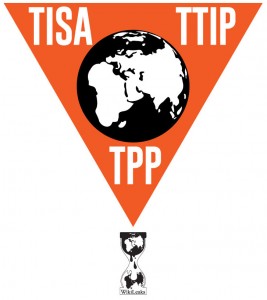 Today, 29 July 2015, WikiLeaks releases a secret letter from the Trans-Pacific Partnership Agreement (TPP or TPPA) Ministerial Meeting in December 2013, along with a comprehensive expert analysis of the document.
Today, 29 July 2015, WikiLeaks releases a secret letter from the Trans-Pacific Partnership Agreement (TPP or TPPA) Ministerial Meeting in December 2013, along with a comprehensive expert analysis of the document.
Download the TPP SOE Ministerial Guidance in PDF or read below.
Download the expert analysis on TPP SOE Ministerial Guidance in PDF or read the HTML.
Zum Artikel
Wo sich Fracking in Deutschland für Konzerne lohnen könnte
Wo sich Fracking in Deutschland lohnen könnte
Von Tillmann Neuscheler
In Amerika hat Schiefergas für den wirtschaftlichen Wiederaufstieg gesorgt. In Deutschland wäre das – selbst wenn wir wollten – so nicht möglich. Doch an einigen Stellen könnte sich Fracking lohnen.
ORF: EU lässt Wasserprivatisierung fallen (schön wär’s)
ORF.at
30.05.2014
EU lässt Wasserprivatisierung fallen
Ein Wasserhahn aus dem jederzeit sauberes Trinkwasser sprudelt, ist für uns selbstverständlich. Umso größer ist die Angst, dass die Wasserversorgung privatisiert werden könnte, darunter die Wasserqualität leidet und die Kosten für Verbraucher steigen.
[Kommentar Berliner Wassertisch: „EU lässt Wasserprivatisierung fallen“ ? Leider sehen wir das nicht so optimistisch. Die EU-Kommission (bzw. die multinationalen Konzerne) versuchen auf alle erdenkliche Weisen, an das flüssige Gold zu kommen und der kommunalen Wasserversorgung den Garaus zu machen. Es locken Renditen in Milliardenhöhe. Das lassen sich die Konzerne nicht gerne entgehen. Spätestens (!) 2018 wird der nächste „Angriff“ erfolgen. Denn dann prüft die EU-Kommission, wie sich die Herausnahme der Wasserversorgung aus der Dienstleistungskonzessionsrichtlinie ausgewirkt hat (mit dem Ziel, auch die Wasserversorgung zu „liberalisieren“). Der Grund dafür ist eine „Review-Klausel“ in der Konzessionsrichtlinie. Deshalb müssen wir auf lange Zeit weiter wachsam sein!
Unsere Freunde in Österreich sollten sich nicht in Sicherheit wiegen, auch wenn es in dem Artikel heißt: „In den vergangenen Jahren ist es NUR zu privaten Beteiligungen an öffentlichen Wasserversorgern gekommen.“ Private Beteiligungen sind auch eine Form der Privatisierung: Es ist bekannt, dass sich Konzerne ab einer Beteiligung von 25% meistens die Betriebsführung in (Geheim)-Verträgen zusichern lassen. Damit hat die Kommune nichts mehr zu sagen, allein der Konzern lenkt die Geschicke der Betriebe. Und was das bedeutet, wissen wir ja von Berlin: Nichts Gutes!]
Dazu auch: Pressemitteilung der AöW vom 21.3.2014



 Pressemitteilungen
Pressemitteilungen